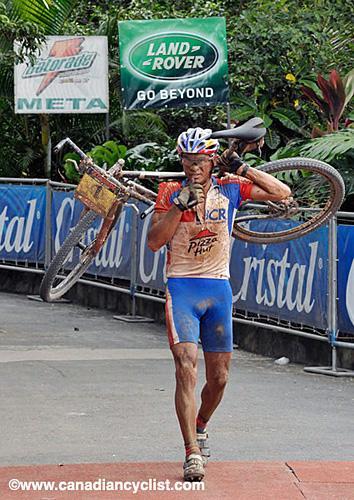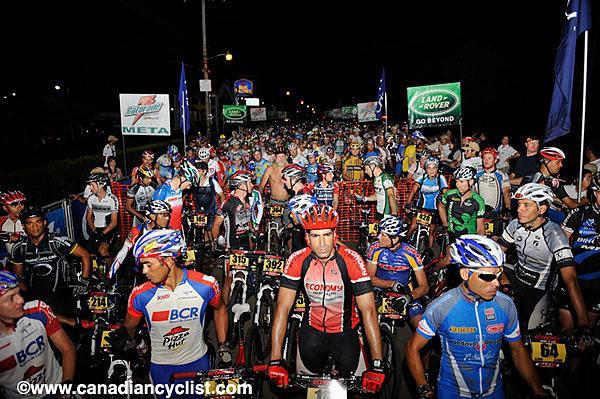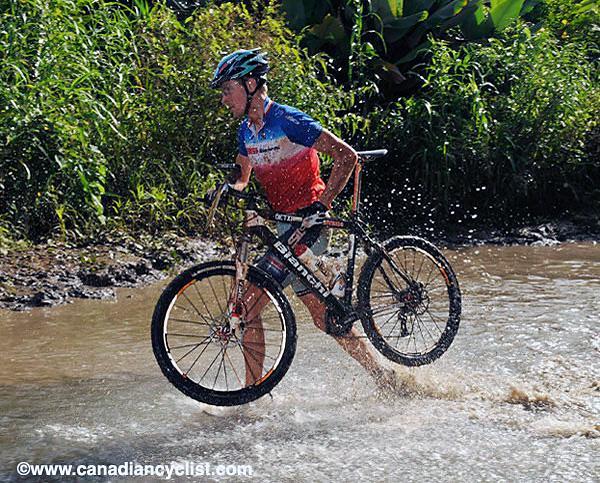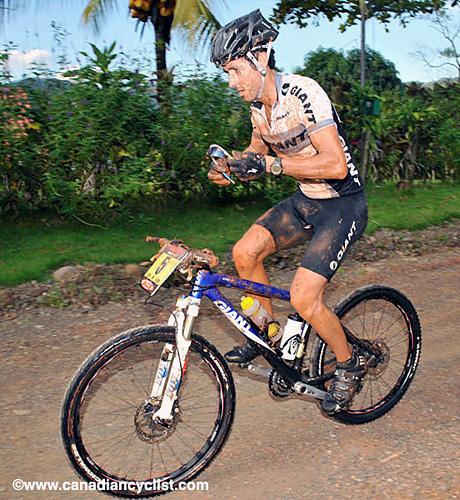La Ruta ready to test the world's best
Costa Rican mountain bike stage race gets better every year




La Ruta de los Conquistadores is one of the world's best-known mountain bike stage races. It's also one of the oldest and most difficult. As riders prepare for the 17th edition starting on November 11, Cyclingnews spoke with the man behind the race, founder Roman Urbina.
"La Ruta didn't start as a race, it started as an expedition. It was an ecological expedition, and we wanted to do what the Spaniards had done in order to see how much damage we had done to our rainforests and our rivers," begins Urbina. "There are vivid descriptions of natural wonders Costa Rica from the 1400s and 1500s."
In 1993, Urbina and 34 others decided to retrace the route of Spanish Explorer Juan de Cavallón, who had travelled from the Pacific Coast through Costa Rica's mountains and onto the Caribbean. The journey turned into a race thanks to a challenge within the ranks of the adventurous crew. "We all got together and one of the guys said, 'Out of my own pocket, I'll give 50 bucks to whoever makes it to the end of the first day first.'
"The first edition started with about 35 riders and only about three finished, which meant doing the whole thing without jumping in a car or getting help. It was three days," he explains. Over the years, the race has grown to four days, its duration for the past two years. Organisers had briefly considered adding a fifth day.
"We changed our mind about adding a fifth day based on the economic crunch," says Urbina. "We would have had to raise our entry fee, and we were losing riders. Four days is hard enough. We'll keep it at that for now."
Urbina notes that the race has grown in participation every year except 2008. "In 17 years, it's been getting bigger and bigger until last year, which was the only year we've ever had negative growth. I think it was due to the economy."
Speaking of trends, Urbina estimates that about 10 percent of his competitors are women – an increase – while there’s also been a broadening of the rider nationality base. In its early days, primarily Costa Ricans contested the race, although in recent years, the event has drawn riders from all over the world, especially North America and more recently, Europe.
Get The Leadout Newsletter
The latest race content, interviews, features, reviews and expert buying guides, direct to your inbox!
"Last year, we had 350 foreigners and 100 Costa Ricans," says Urbina. "The interesting thing was that we didn't have as many American riders, but we had a lot more European riders, which in the end almost balanced (the number of foreigners) out. The year before, we had about 150 American riders and last year we had 60 or 70.
"On the European side, we had more Spanish riders, mainly because Roberto Heras went last year. I think the big names sometimes draw people. We've seen that with riders like Lance [Armstrong] at some races." He adds wishfully, "I'd love to have Armstrong do this race."
Former Vuelta a España winner Heras (below) will also return to La Ruta in 2009 to improve upon his seventh-place performance.

Obstacles – Latin American culture
Putting on a stage race requires plenty of logistical coordination, and it's easier to do that in some places than in others. "Latin America is a hard place to have the same kind of race organisation as in North America, but we're solving problems year by year," says Urbina.
Racing at home on familiar terrain certainly helps the locals, but many foreigners have complained over the years that they have an unfair advantage in that they receive illegal outside assistance during the event. Urbina confirmed that the Costa Ricans' families and friends often do whatever they can to 'help' their favourites.
"There used to be a big difference in that the local people would come out and help with the support for the Costa Ricans," he says. "It was so hard to get the Latins to obey the rules - they cheat so much. The Latin Americans were cheating by taking hand-ups outside of the aid stations. It's such a big event and they'd all have their girlfriends and wives there, who want to participate. It's not like going to Canada or Germany or Africa where people follow the rules. It's been a battle trying to get these guys to obey."
In recent years, Urbina has been trying to level the playing field for international competitors. "What we're doing for the top international riders now is that we change the odds by giving support to all the top riders, so the foreigners don't feel like they only have support at the aid stations while the locals get support everywhere."
La Ruta is also affiliated with the Costa Rican Cycling Federation now with the hope that the federation can assist with any punishments needed for those who still cheat.
Doing research
In recent years, Urbina has spent less time occupied with daily race operations and more time travelling the world and participating in other endurance mountain bike events. There are two main reasons for this: Firstly, he gets to spread the word about La Ruta, and secondly, he can learn from what other promoters are doing and thereby improve his race.
"What I've been doing for the race is going to different races around the world, meeting people and racing, too. That's my passion and my love," he says. "I've done a lot of the multi-day stage races because that's our target market and those people are the ones who will come to our race.
"I was part of the first Latin team to do the TransAlps, and I've done it three times. I was invited to do the Cape Epic. I've done the hardest race in Brazil - a 12-hour race and a three-day race in Venezuela. I've done the Trans Mexican. I've also done TransRockies and a lot of 24-hour races."
What he hasn't done yet are races like the Crocodile Trophy in Australia. Noting how hard the Crocodile Trophy is, he admits, "I like to go to races that anybody can go to if you train hard enough." Urbina says mountain biking is his passion, but he considers himself a multi-sport athlete who loves to do ultra swims and ultra runs. He noted that having done a 245km off-road run not long ago, he was interested to see there were more women than men competing and that the women were finishing among the top men.
"If it’s long enough, the women can do so well," he says. "They can withstand a lot mentally and physically. In the ultra runs, the women come in the top five. It's like that in swimming, too, but you don't see that much in mountain biking yet."
Continuous improvement
Every year Urbina and his team try to improve La Ruta. He knows that what brings racers is word of mouth and good organisation. It's also got to be fun. "I'm not trying to make it the hardest mountain bike race ever. This is just a tough country to traverse," he says.
He has been reducing the amount of hike-a-biking each year. "There is still a lot of it on day one, which is the make or break day. That day has everything. It’s a wake-up call for a lot of people. People find themselves in the middle of the jungle hiking for two and a half hours. They say 'wow, it is really hard'.
"Like any hard race, 90 percent is mental and 10 percent is physical. It's just about how you take it. If you are very stressed and fixate on things like how much you will average speed-wise... I think those are the guys that suffer the most and blow up. If you just go like a snail and keep moving, moving, moving, you end up finishing."
After hearing reports that La Ruta was too hard, Urbina decided to prove a point. "I invited a famous one-legged rider, Brett Wolfe, and he's done the race twice. He hops the hike-a-bike sections. There is also an amputee who has done it twice. Last year a guy with one arm did it. It's harder for him I think because he can't pick up his bike as well."
Urbina is the lead moto driver in the race and after the leaders are in, he goes back out to follow the last rider in, which last year included Wolfe. "I spent a lot of time with this guy. I don't know how he did it!" There has also been a blind woman who completed the race on a tandem bike. "So, La Ruta is hard, but not impossible," concludes Urbina.
"We are working to make it a better experience for the riders. We want them to get better accommodations," admits Urbina who sums up the mentality behind the popularity of mountain bike stage races by adding, "Racers want something hard, but enjoyable in the end. They want a sense of accomplishment."
This year's race
The MonaVie Cannondale team is expected to show up with several riders, including Jeremiah Bishop and Tinker Juarez. Bishop will be returning to the event after a gruesome crash in 2006 in which he broke his jaw and had to withdraw from the race.
"It'd be great if he came back and won it. He was trying so hard last time," says Urbina. "It was the second of three days, and he was leading the stage. (Leonardo) Paez had put 15 minutes on him the first day, and Bishop was trying to get it back. He was two or three minutes ahead and he'd already done the hardest downhill and he was within 30km of the finish."
"I said I'd go ahead and warned him it was loose. Then a cop came by and told me there was an accident. He had a four-hour operation afterward. "
Juarez, on the other hand, is a La Ruta regular. "He's done it about five times and has often been the top American. He was the first foreigner to ever win a stage," explained Urbina. "He won the hardest one, too, the first day. Thomas Frischknecht also did something incredible. After the first day [in 2005], he took back the lead and put 15-20 minutes on everyone. He gave a clinic on how mountain bike racing should be done. It was the year he won, it was amazing."
Federico Ramirez has won more than anyone else, with five editions. "He's not as good outside of Costa Rica, but at home he dominates," says Urbina. "He's placed well in the TransAlps and TransRockies though."
In the next few days Ramirez and the other favorites will have a chance again at La Ruta. The four-stage race begins Wednesday.
Stay tuned to Cyclingnews for coverage of this year’s La Ruta de los Conquistadores.
"I'm not trying to make it the hardest mountain bike race ever. This is just a tough country to traverse," said La Ruta founder Roman Urbina of his four-day mountain bike stage race run through Costa Rica.
Sue George is an editor at Cyclingnews. She coordinates all of the site's mountain bike race coverage and assists with the road, 'cross and track coverage.